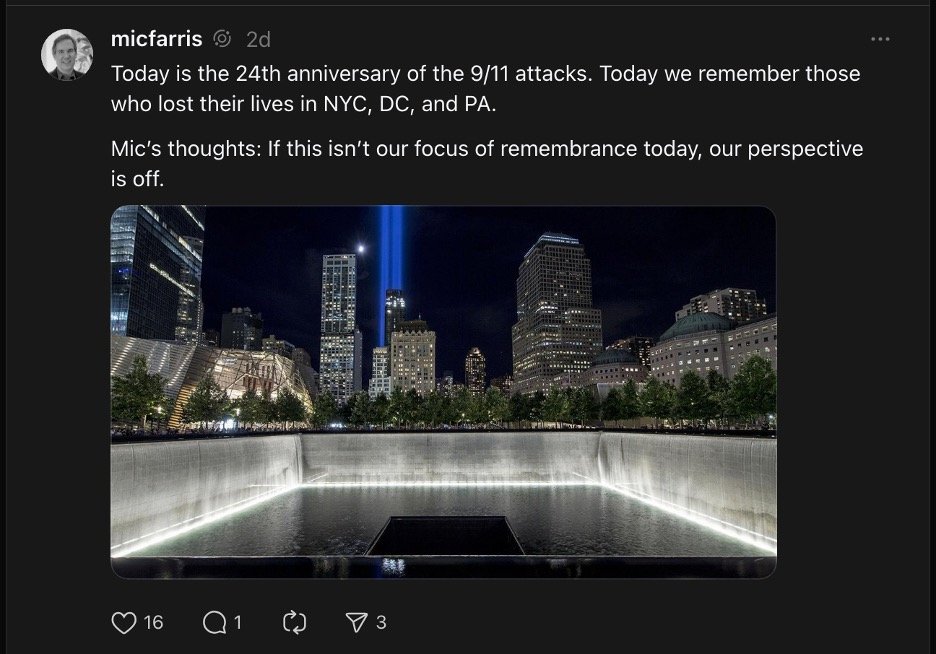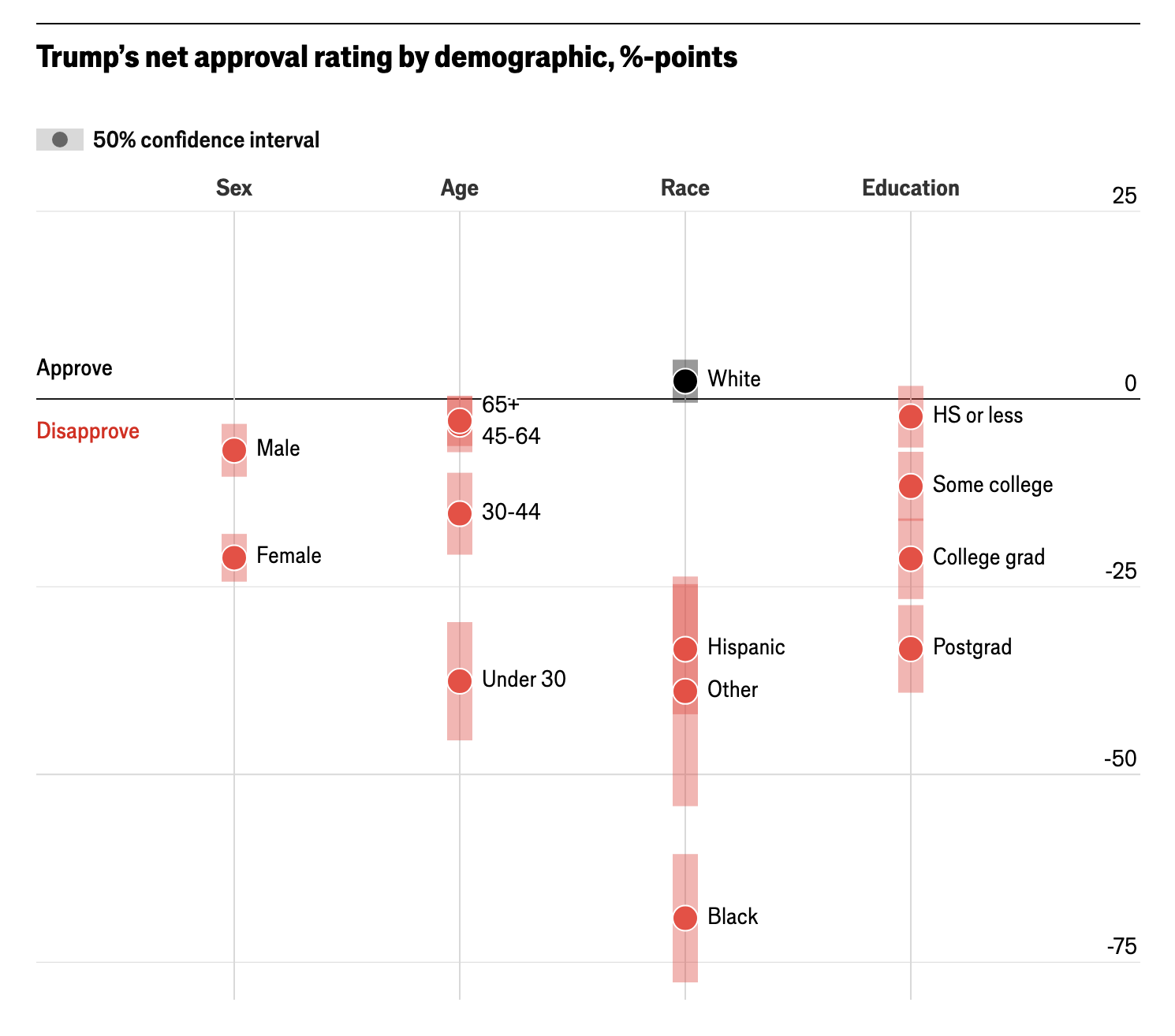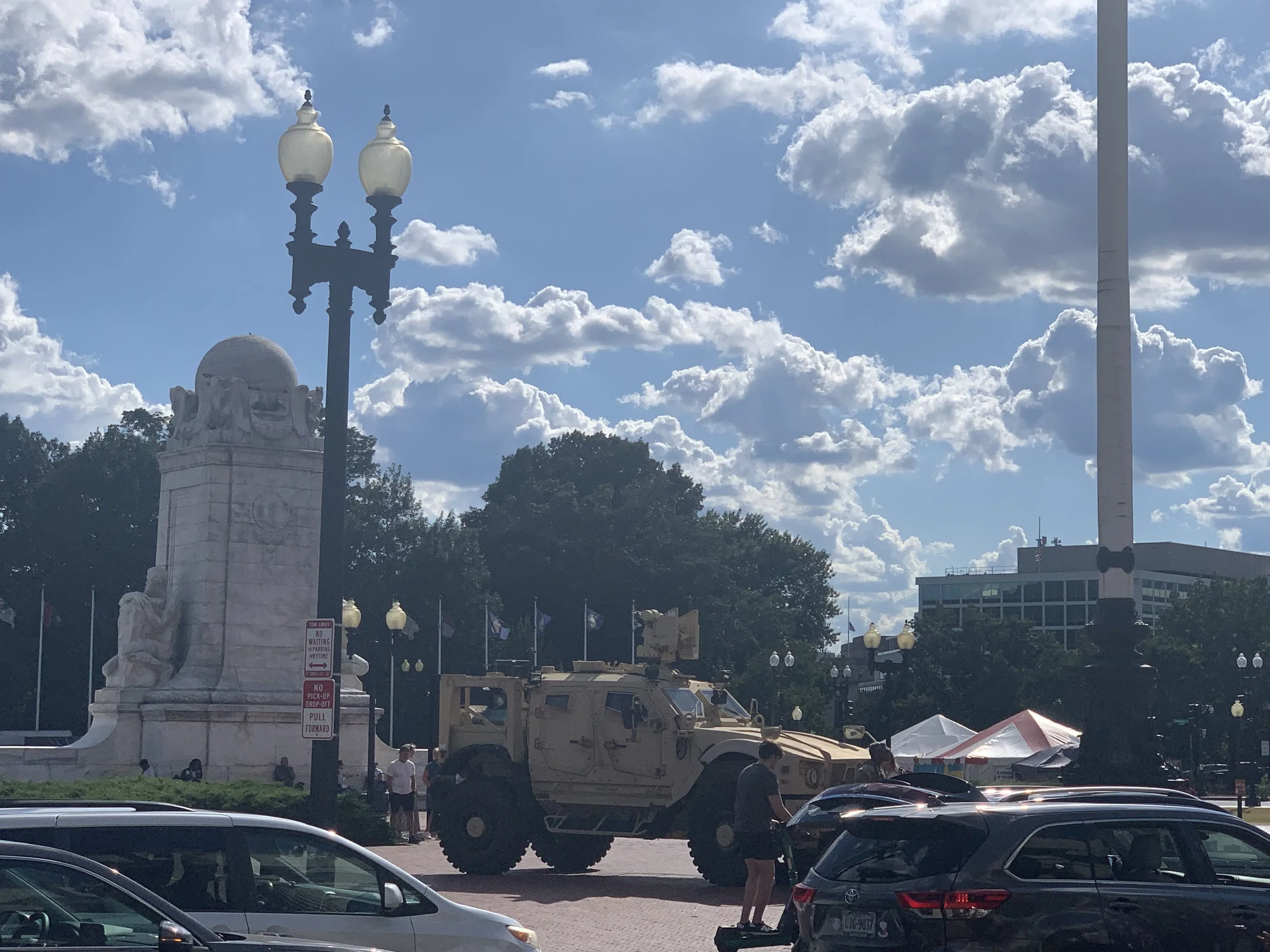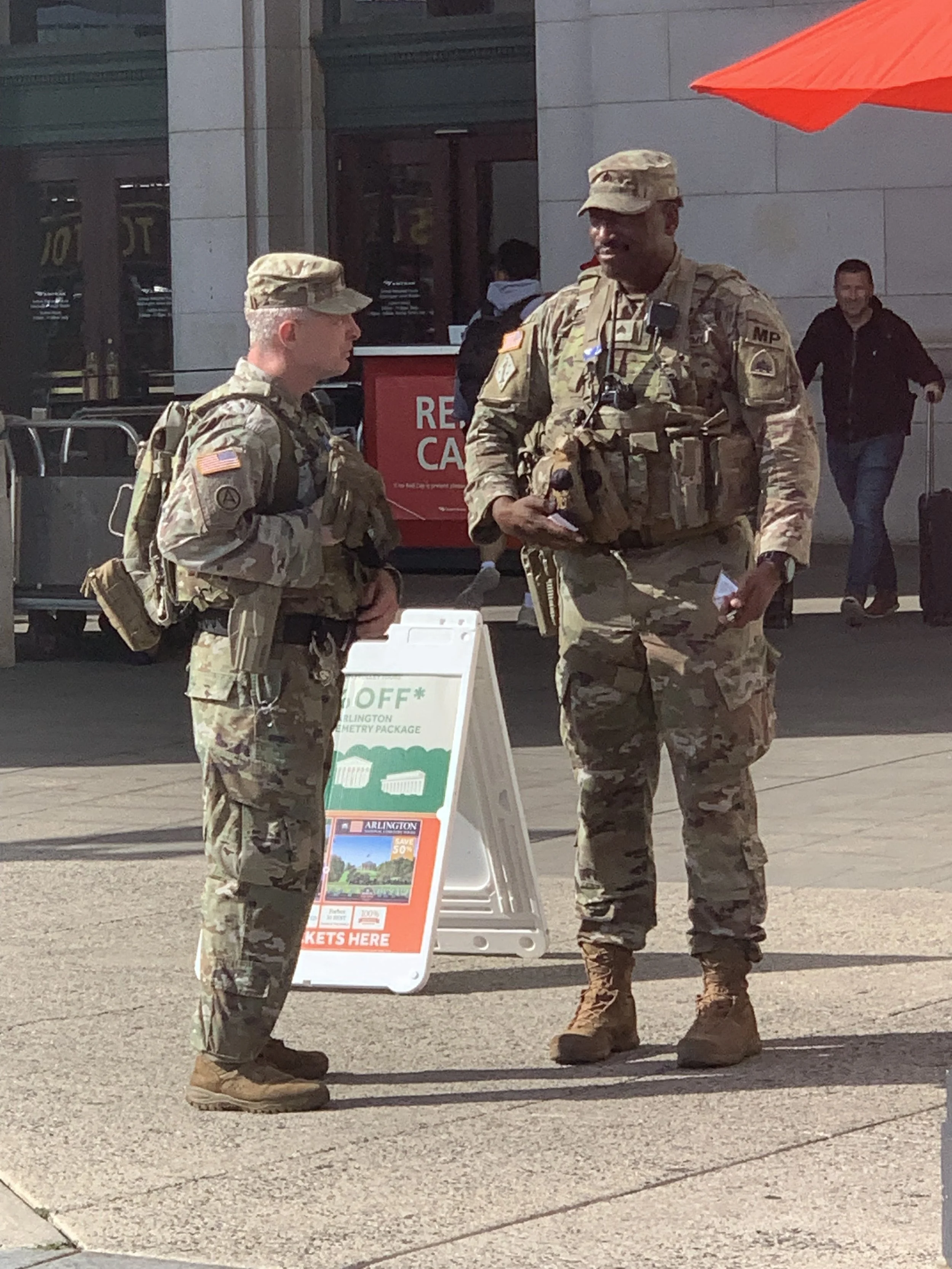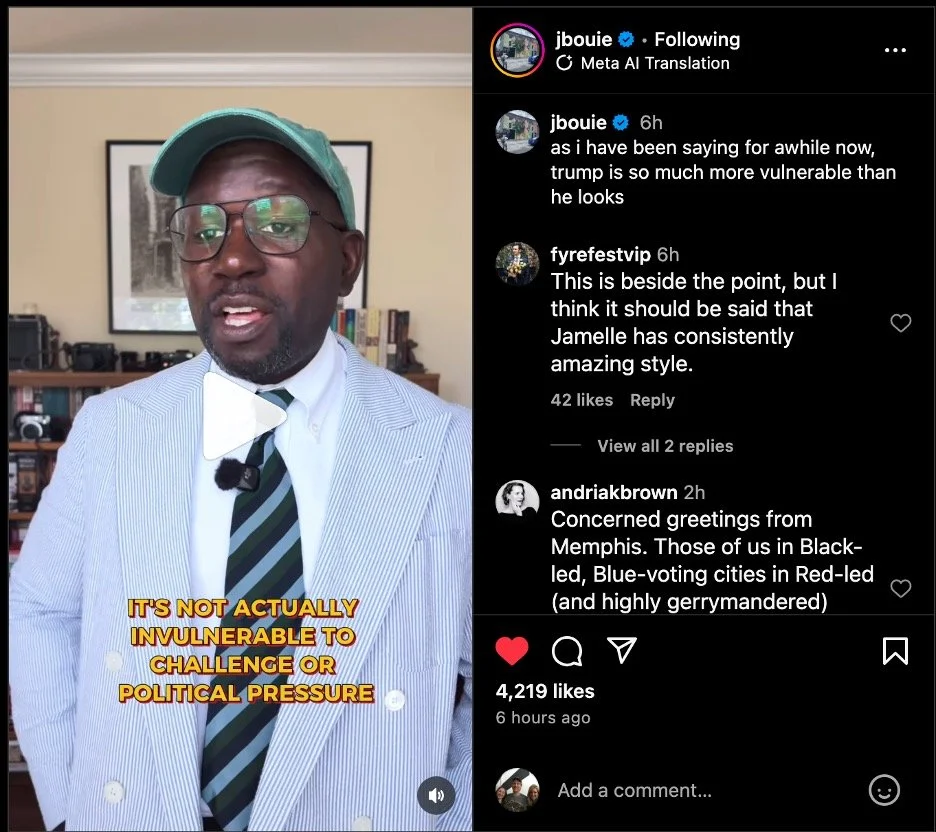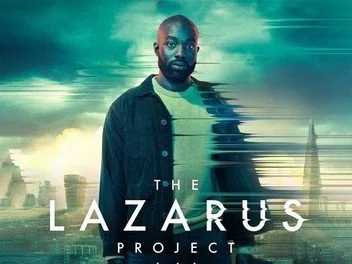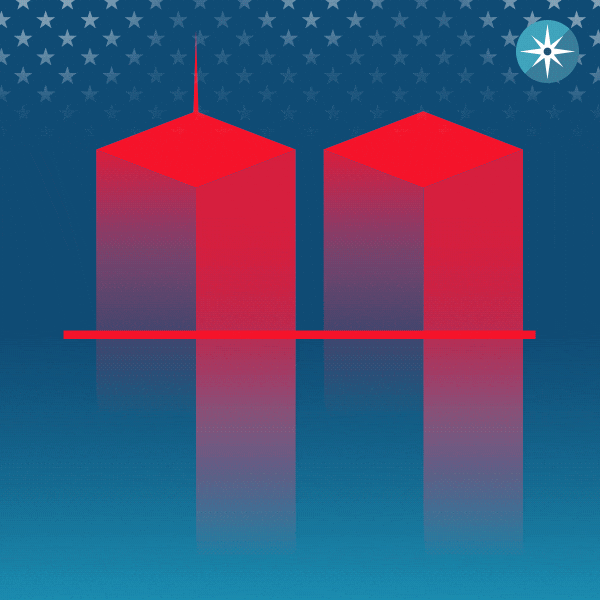Never Forget
Keep perspective. Acknowledge the truth in front to us.
If you’d like these posts delivered directly to you, subscribe to the Decisions newsletter now!
24 Years Ago
This week marked the 24th anniversary of the September 11 attacks on America. I’ve written previously about my personal connection to the attacks [1] and why I continue to wear a 9/11 remembrance pin during public service events.
When it’s said we should “never forget,” I consider it to mean “never.” I noted this in a social media post, [2] given the other events that seemed to draw people’s attention.
Post from me on Threads [2]
Kirk Shooting
Given the events of this week, we of course cannot overlook the shooting of conservative political activist Charlie Kirk. This shooting is one more event in a cascade of political violence that has rapidly accelerated over the past decade: [3]
2011
6 killed, 13 others including then-Rep. Gabrielle Giffords wounded in Tucson shooting
2017
Rep. Steve Scalise shot during congressional baseball game practice
2020
13 men arrested for plotting to kidnap Michigan Gov. Gretchen Whitmer
2021
January 6 attack on the US Capitol, pipe bombs at RNC and DNC
2022
Kentucky mayoral candidate targeted in attempted shooting
Paul Pelosi attacked with hammer in his home
2023 – 2024
New Mexico state legislature candidate orchestrates shootings, murder for hire
2024
1st attempted assassination of Donald Trump
2nd attempted assassination of Donald Trump
Kamala Harris campaign office in Arizona shot at 3 times in a month
Murder of United Healthcare CEO Brian Thompson
2025
Arson at Pennsylvania Gov. Josh Shapiro's residence
Killing of two Israeli embassy staffers in Washington, D.C.
13 people injured in Colorado firebombing attack, 1 later dies
Minnesota lawmaker shootings
Shooting at CDC headquarters
Shooting of Charlie Kirk
I think this is the perspective we should take from this week’s event – this shooting is one more in an escalating series of politically violent events.
In a discussion between New York Times columnists David French, Michelle Cottle, and Jamelle Bouie worth reading in detail, the following portion of the discussion captures the discussion well: [4]
David French: There are a few things. Going back to Jamelle’s point: When I wrote my piece that was published Thursday morning about Kirk and about the assassination — Charlie and I had a lot of disagreements; we represent very different parts of the broader American right. There were a lot of disagreements there. But I chose not to highlight those in that discussion.
I mentioned that we had disagreements, but I didn’t foreground them for a very specific reason: When you’re looking at the shock, horror and trauma of what just unfolded on that college campus, the gravity of that is so much greater than my political disagreements. I didn’t want to emphasize those in this moment, because I wanted to rest on the most important things — the gravity of the loss of a husband and father, and also how and where it happened.
The thing that really stuck with me when I got up this morning is that this happened on a college campus. It happened during a debate, or a debate-type event, on a college campus. And rather than hashing these things out, one person chose to end the conversation with a bullet.
The fact that it occurred on campus, in front of thousands of students, and to a person who, as I wrote in my piece, is almost omnipresent in the social media feeds of politically engaged Gen Zers — all of that matters. It’s very difficult to find a Gen Zer who pays any attention to politics and doesn’t know who Charlie Kirk is. Virtually impossible. Taken together, I think those things make this a more seminal cultural event than we might otherwise think.
What are students going to be thinking about debate on campus now? People who speak on college campuses — and I know all of us here do — how do we feel approaching an event on a college campus now? These college debates, or discussions, are some of the lifeblood of our democracy. When you have a murder in the middle of a college event, in addition to the horrific tragedy impacting Charlie, his family and his friends, there’s also this radiating impact into the culture — specifically the culture of the college campus. What I’ve been thinking about is both the horror of the moment itself and the ripple effects it’s going to have on American discourse.
Bouie: I take that observation, I take that point about the consequence and the weightiness of this particular incident. My response here is less about those making that point and more about what I sense is a kind of sanctification of Kirk as this exemplar of dialogue and discourse in the country. I don’t think that’s an accurate picture of the man who lived. He was prolific, so it’s not particularly difficult to get a good sense of what Kirk believed about things and whose stated beliefs were in essence that people of his ideological persuasion ought to be able to suppress the views of the people they don’t like.
That’s what the professor watch list was — and it’s something his organization continues to maintain: a list of professors, instructors, adjuncts and others on college campuses, targeting their speech if they say things he or his organization don’t like. It’s been strange to me to see Gov. Gavin Newsom praise Kirk as being committed to good-faith discourse, and then to read an entry on this watch list about a professor who wasn’t even speaking in the classroom, but as a private citizen in his own life. At the bottom of the entry, it says: “Contact this person’s employer” — essentially inviting people to harass him, maybe even try to get him fired.
What I want is for people to be able to do two things at once. As David said, acknowledge that this was a tragedy for Kirk, his family and his friends — something that never should have happened, and something very consequential. But at the same time, we can’t airbrush this man’s life and legacy as a political communicator.
Because of the heightened political tension and the focus by some on punishing those with differing views, people are being fired (e.g., Matthew Dowd at MSNBC) [5] because those views don’t appear to be expressed to the liking of those on the right. Dowd wrote about his journey and what happened in his newsletter (and, based upon the circumstances, seems like an overreaction of the part of the network): [6]
Years ago when I was at ABC News as Chief Political Analyst I was very critical of Donald Trump and the Republican Party as I saw our constitutional democracy threatened. A number of times then President Trump and White House staff called up the head of ABC News and tried to get me to back off and have me fired. ABC News folks came to me a number of times after that and tried to get me to not be so critical. I ultimately left ABC News and ended up as senior political analyst at MSNBC.
At MSNBC I have made nearly 1,000 appearances, speaking on a diverse range of topics and always consistently condemned gun violence and political violence of any kind no matter where it came from. This past Wednesday I was asked to come on to talk about a range of topics, and as I was about to go on air, breaking news happened of gun shots being fired at a Kirk event in Utah.
Keep in mind when the anchor came to me to comment on the “national environment” the only thing known at the time was shots were fired and there was no reporting yet that Kirk was the target or had been shot at. I said in the moment that we needed to get the facts because we have no idea what this could be and that it could easily be someone firing a gun in the air to celebrate the event. Remember Kirk is a diehard advocate of the 2nd amendment.
I said that Kirk has been a very divisive and polarizing figure. I then added that we are in a toxic time in America, unlike every other democracy in the world, where we have a combination of divisiveness and near unlimited access to guns. The effort by Holocaust survivors to remind folks of Germany in the 1930s #ItStartedWithWords came to my mind and I said my now legendary line “hateful thoughts lead to hateful words which ultimately lead to hateful actions”. I thought to myself how could anyone disagree with this. I guess I was naive.
The Right Wing media mob ginned up, went after me on a plethora of platforms, and MSNBC reacted to that mob. Even though most at MSNBC knew my words were being misconstrued, the timing of my words forgotten (remember I said this before anyone knew Kirk was a target), and that I apologized for any miscommunication on my part, I was terminated by the end of the day.
Trump Threatening Violence
I’ve written before that Trump seems to be declaring an uncivil war on the part of America that doesn’t support him, which according to current polls is 59% of the country. [7][8]
From “Tracking the Presidency,” The Economist [8]
After the Kirk shooting, President Trump threatened “the radical left” from the Oval Office blaming his political adversaries for the violence: [9]
In a video address from the Oval Office, Mr. Trump declared it a “dark moment for America” and faulted the media and the “radical left” for language used to describe people like Mr. Kirk.
“For years, those on the radical left have compared wonderful Americans like Charlie to Nazis and the world’s worst mass murderers and criminals,” said Mr. Trump, who one day earlier had been face-to-face with protesters in Washington who called him Hitler. “This kind of rhetoric is directly responsible for the terrorism that we’re seeing in our country today.”
His military deployment of the National Guard in Los Angeles was met with protests, and now the court challenge has been heard about whether Trump’s LA deployment was legal.
It wasn’t.
From NBC News reporting: [10]
LOS ANGELES — A federal judge in California ruled Tuesday that the Trump administration violated a 19th-century law barring the use of soldiers for civilian law enforcement activities when it mobilized 4,000 National Guard troops and 700 Marines to Los Angeles in June.
"The evidence at trial established that Defendants systematically used armed soldiers (whose identity was often obscured by protective armor) and military vehicles to set up protective perimeters and traffic blockades, engage in crowd control, and otherwise demonstrate a military presence in and around Los Angeles," U.S. District Judge Charles Breyer in San Francisco said in a 52-page filing.
"In short, Defendants violated the Posse Comitatus Act," he said.
Judge Breyer goes through a nice overview of the Posse Comitatus Act and its historical context. [11] The Act, originally passed in 1878, was an expression of denying the use of the military to serve as law enforcement within the states.
As Judge Breyer wrote: “Indeed, resentment of Britain’s use of military troops as a police force was manifested in the Declaration of Independence, where one of the American colonists’ grievances was that the King had ‘affected to render the Military independent of and superior to the Civil power.’” [12]
The Act was passed a century after the American Revolution, mostly as a post-Reconstruction response from Southern states about the presence of federal troops. As noted by the Brennan Center for Justice, “[d]espite the ignominious origins of the law itself, the broader principle that the military should not be allowed to interfere in the affairs of civilian government is a core American value.”: [13]
What does the term “posse comitatus” mean?
In British and American law, a posse comitatus is a group of people who are mobilized by the sheriff to suppress lawlessness in the county. In any classic Western film, when a lawman gathers a “posse” to pursue the outlaws, they are forming a posse comitatus. The Posse Comitatus Act is so named because one of the things it prohibits is using soldiers rather than civilians as a posse comitatus.
What are the origins of the Posse Comitatus Act?
The Posse Comitatus Act was passed in 1878, after the end of Reconstruction and the return of white supremacists to political power in both southern states and Congress. Through the law, Congress sought to ensure that the federal military would not be used to intervene in the establishment of Jim Crow in the former Confederacy.
Despite the ignominious origins of the law itself, the broader principle that the military should not be allowed to interfere in the affairs of civilian government is a core American value. It finds expression in the Constitution’s division of power over the military between Congress and the president, and in the guarantees of the Third, Fourth, Fifth, and Sixth Amendments, which were in part reactions to abuses committed by the British army against American colonists.
Today, the Posse Comitatus Act operates as an extension of these constitutional safeguards. Moreover, there are statutory exceptions to the law that allow the president to use the military to suppress genuine rebellions and to enforce federal civil rights laws.
Trump deployed troops in Washington DC and was able to do so in contrast with the illegal California deployment because the District isn’t a state (by the way, I’ve included a couple pictures below from my recent trip to DC when arriving at Union Station - no true safety reason for the Guard to be there…). Trump needs permission to enter a state with the National Guard, and although Trump’s next threatened target was the city of Chicago, Illinois Governor JB Pritzker and the residents of America’s third largest city stood up to Trump. [14]
So, President Trump has “shelved his plans to target Chicago as the next city for his domestic crime push after advisers warned him that sending in troops to help with local law enforcement without buy-in from the state’s governor could create legal headaches they want to avoid, sources familiar with the matter told CNN.” [15]
While Trump has privately argued he has the power to send the National Guard where he wants, he’s decided for now to set his sights on Memphis because the Democratic city, and more specifically the state’s Republican governor, is willing to accept federal help, the sources said.
This reel from Jamelle Bouie is spot on, [16] highlighting the need to stand up to the bully because it works.
Instagram reel from Jamelle Bouie (@jbouie) [16]
A Little History
Marking the Semiquincentennial of American Independence 250 years ago
September 1775 – The beginning of the ill-fated Quebec Campaign
From The American Battlefield Trust: [17]
After the Americans had successfully captured Fort Ticonderoga on May 10, 1775, Patriot commanders, including Gen. Phillip Schuyler, gained confidence in the strength of the American forces. With faith in the Continental army, Schuyler made plans to invade Canada in order to rally support among French-Canadians for the American cause. Quebec was held by British Gen. Guy Carleton, who acted as both provincial Governor and commander of the British troops.
The initial American efforts to invade Canada began in September 1775, when Ethan Allen and his “Green Mountain Boys“ attempted to capture Montreal. With a force of only 100 militia, Allen’s men were defeated, and Allen was imprisoned. In addition to this failed attempt, Gen. Schuyler, who was also meant to lead his army into Montreal, fell ill and was forced to delegate the invasion to Gen. Richard Montgomery.
Although the preceding circumstances were demoralizing, Montgomery successfully captured Montreal on November 13, 1775. Following this success, the Patriot forces turned their attention towards invading Quebec.
This British thriller series lasted two seasons and received a BAFTA award for best drama series.
A man wakes up to find himself reliving the same events over and over again. Confused, he is introduced to the Lazarus Project, a top-secret organization that uses its ability to rewind time to save the world from extinction. [18]
It’s time travel. It’s a secret organization trying to protect the world. It’s nerdy, so right up my alley…
GIF Game
Notes and Sources
[1] Mic Farris, “9/11. 20 Years Later.” September 11, 2021, https://www.micfarris.com/articles/9-11-20-years-later
[2] Mic Farris [@micfarris], Threads, September 11, 2025, https://www.threads.com/@micfarris/post/DOdiuYjkXpM
[3] Nadine El-Bawab and Brittany Shepherd, “Charlie Kirk shooting: A timeline of recent political violence in America,” ABC News, September 12, 2025, https://abcnews.go.com/Politics/charlie-kirk-shooting-timeline-recent-political-violence-america/story?id=125473910
[4] Jamelle Bouie, Michelle Cottle, and David French, “The ‘Fork in the Road’ After Charlie Kirk’s Death,” The Opinions, New York Times, September 13, 2025, https://www.nytimes.com/2025/09/13/opinion/charlie-kirk-killing-legacy.html
[5] Jack Dunn, “Matthew Dowd Fired From MSNBC for Charlie Kirk Comments,” Variety, September 10, 2025, https://variety.com/2025/tv/news/matthew-dowd-fired-msnbc-charlie-kirk-death-1236514875/
[6] Matthew Dowd, “A Time to See With New Eyes,” Lighthouse Sentinel, September 12, 2025, https://matthewdowd.substack.com/p/a-time-to-see-with-new-eyes
[7] Mic Farris, “Battles in an Uncivil War,” June 7, 2025, https://www.micfarris.com/articles/battles-in-an-uncivil-war
[8] “Tracking the Presidency,” The Economist, retrieved September 13, 2025, https://www.economist.com/interactive/trump-approval-tracker
[9] Maggie Haberman, “At the White House, Trump’s Grief and Shock Turn to Rage Over Charlie Kirk,” New York Times, September 10, 2025, https://www.nytimes.com/2025/09/10/us/politics/trump-reaction-charlie-kirk.html
[10] Alicia Victoria Lozano, Ryan J. Reilly, and Megan Lebowitz, “Judge rules Trump illegally deployed National Guard and Marines to Los Angeles,” NBC News, September 2, 2025, https://www.nbcnews.com/news/us-news/judge-rules-trump-illegally-deployed-national-guard-l-rcna224779
[11] Newsom v. Trump, 3:25-cv-04870, (N.D. Cal.), Document 176, September 2, 2025, https://storage.courtlistener.com/recap/gov.uscourts.cand.450934/gov.uscourts.cand.450934.176.0_4.pdf
[12] Declaration of Independence, July 4, 1776, https://www.archives.gov/founding-docs/declaration-transcript
[13] Joseph Dunn, “The Posse Comitatus Act Explained,” Brennan Center for Justice, October 14, 2021, https://www.brennancenter.org/our-work/research-reports/posse-comitatus-act-explained
[14] Mic Farris, “Routes to Power,” September 7, 2025, https://www.micfarris.com/articles/routes-to-power
[15] Alayna Treene and Hannah Rabinowitz, “Trump shelves Chicago crackdown plans for now as advisers warn of legal headaches,” CNN, September 12, 2025, https://www.cnn.com/2025/09/12/politics/chicago-memphis-trump-national-guard
[16] Jamelle Bouie [@jbouie], Instagram, September 13, 2025, https://www.instagram.com/reel/DOjEPNmAOXT/?igsh=NTc4MTIwNjQ2YQ==
[17] “Quebec City, QC | Dec 31, 1775,” American Battlefield Trust, retrieved September 13, 2025, https://www.battlefields.org/learn/revolutionary-war/battles/quebec
[18] “The Lazarus Project,” IMDb, retrieved September 13, 2025, https://www.imdb.com/title/tt14190592/
Decisions with Mic Farris
Seek Truth. Honor Differences.
